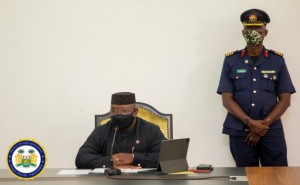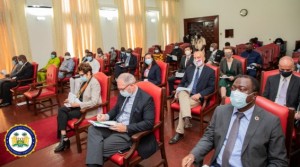By Foday Moriba Conteh
Solomon Jamiru, the Spokesperson of NaCOVERC, while addressing newsmen at the Ministry of Information & Communications organized weekly Press Conference on the 11th March 2021 revealed that the Ministry of Health & Sanitation will today, the 15th March 2020 commence the rolling out of the Sinopharm and AstraZeneca-Oxford Vaccination.
He furthered that they want to administer the vaccines to as many Sierra Leoneans as possible with the singular objective of saving lives and preventing Sierra Leone from being labeled as a high risk country with less or no vaccination effort.
The Spokesperson intimated that there is already a strategic rollout mechanism in place underpinned by principles of priority, safety and efficacy and 50 vaccination sites (3 per district) have been identified for the rollout.
A high profile vaccination will be initiated at State House on the said rollout date and President Maada Bio is said to be the first to be vaccinated..
In another development, on the 12 March 2021 President Julius Maada Bio engaged development partners and the diplomatic community on the successes of Sierra Leone in the fight against COVID-19 and the plan to roll out vaccination throughout the country.
The meeting brought together the Ministry of Health and Sanitation, NaCOVERC, UN Resident Coordinator, European Union, Deputy Head of the United States Embassy, British High Commission, Irish Embassy, Chinese Embassy, Germany Embassy, the World Bank Country Manager, UNICEF Country Representative and WHO Country Representative.
In his welcome statement, Chief Minister Professor David Francis said the second interface and strategic meeting between the Government’s COVID-19 response Presidential Task Force and development partners within the DEPAC framework, was timely, adding that they would highlight the successes, challenges, a transition from the COVID-19 Emergency Response to post-emergency recovery and the rollout of the COVID-19 vaccination programme.
President Bio said the meeting was of special importance in the response to the COVID-19 pandemic, saying that the country had fought a good fight.
“Some of the major objectives of our fight have been achieved by reducing mortality and also making sure that livelihoods are not compromised,” he assured, emphasising that science and data had always helped them in the fight against COVID-19.
He further stated that development partners are an integral part of the fight against the scourge, adding that the country is entering into an important milestone in the fight by administering the COVID-19 vaccines. He, therefore, said it is necessary that development partners are informed before the administration of those vaccines.
“We have received vaccines from the People’s Republic of China and another set from COVAX. We cannot roll these out without informing you as partners. On behalf of the people of Sierra Leone and myself, I want to thank you for the many challenges that you have to endure with us in our response to COVID-19. The support that you have given in terms of PPE and many other technical supports is huge and we are very proud of the partnership between us and our donor community in Sierra Leone,” he said.
Giving out an overview on how the Coronavirus vaccines would be rolled out in the country, Dr Tom Sesay said that Sierra Leone had received 296,000 doses in total, of which 200,000 doses were from the People’s Republic of China and 96,000 doses from the COVAX facility.
“There will be a symbolic launch of the vaccines on Monday 15 March 2021 at State House. It will be for high-profile politicians. We are having a conservative target of 150 people on that day.
“It will be followed by a symbolic launch of the vaccines at the Miatta Conference Hall, where we will focus on the Health Care Workers, even though we will be prioritising those that are above 60 years of age. Vaccination for the rest of the country will start on the 22nd of March 2021,” Dr Sesay said.
Highlighting the many successes in the fight against COVID-19 so far, Minister of Defence and Interim Coordinator of NaCOVERC, Brigadier (Rtd.) Kellie Conteh, said before the outbreak in Sierra Leone Government had put in place many structures that eventually helped in the fight. He added that President Bio had visited many areas in the country to assess the existing structures and the level of preparedness.
“Up till today, we have 3,932 positive cases of the Coronavirus, 1,639 of that number are from women, representing 41.6%, while 2,293 are male, representing 58.4% of the total positive cases. Western Area Urban remains the epicentre for infection in the country with 2,244 cases recorded so far.
“We have trained point-of-entry personnel on Coronavirus case detection across all our border entering points, provided a strategic plan for the response, including a transition plan. We are very much pleased with the laboratory successes because we started with three and today we have six functional labs across the country,” he stated.
The NaCOVERC boss also noted that when the virus entered the country in March 2020, they were testing at 100 per day, saying that they had now expanded the number of testing to 1,000 per day.
The United Nations Resident Coordinator, Dr Babatunde Ahonsi, thanked the President and the people of Sierra Leone for the opportunity to be a part of the dialogue on the cluster of health issues. He congratulated the country for the success so far achieved in dealing with the fight against Coronavirus.
“Recovering from COVID-19, in our view, is part and parcel of advancing Agenda 2034 Sustainable Development and the progress that can be very rapidly made in achieving the target within the National Development Plan. We still have work to do in terms of risk information and social mobilisation,” he noted.
He encouraged the Government to vaccinate a large proportion of the population and encouraged Sierra Leoneans to continue to observe social distancing, hand washing and the use of facemasks.
“United Nations stands ready to continue to work with the Ministry of Health and NaCOVERC and other partners to ensure Sierra Leone is able to put Coronavirus behind us and, in the process of doing that, strengthen the health system to deal with future health emergencies and very quickly return to the path of sustainable national development,” he concluded.






